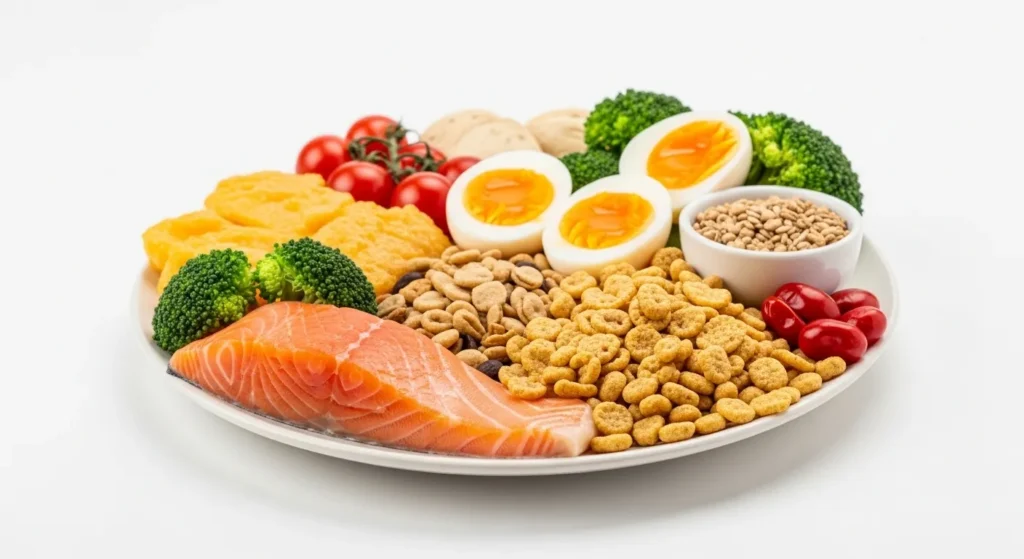Are you experiencing hair loss and wondering if your vegetarian lifestyle might be the cause? A vegetarian diet cause hair loss if it lacks vital nutrients like protein, iron, or vitamin B12—nutrients essential for strong, healthy hair.
This blog explores the connection between plant-based diets and hair health, offers practical prevention tips, and explains when to seek expert help. Whether you’re a long-time vegetarian or just starting, this guide helps you maintain your hair and health with confidence.
The Science Behind Hair Growth and Nutrition

How Hair Grows: An Overview
Hair growth occurs in cycles—anagen (growth), catagen (transition), and telogen (resting). Each strand of hair relies on a consistent supply of nutrients to grow effectively. When nutritional intake is compromised, hair may enter the resting or shedding phase prematurely, leading to visible hair thinning.
Nutrients Critical for Healthy Hair
Healthy hair requires a balanced intake of:
- Protein – Builds keratin, the core structural component of hair.
- Iron – Supports oxygen delivery to hair follicles.
- Zinc – Aids in tissue repair and follicle health.
- Vitamin B12 – Essential for red blood cell production and oxygen transport.
- Biotin – Strengthens hair strands and promotes growth.
- Omega-3 Fatty Acids – Nourish the scalp and hair shafts.
Can a Vegetarian Diet Cause Hair Loss?
How Vegetarian Diets May Lead to Nutrient Deficiencies
While vegetarian diets offer many health benefits, they can fall short in certain hair-essential nutrients, particularly when poorly planned. Common deficiencies include:
- Protein: Many vegetarians underestimate their protein needs.
- Iron: Plant-based (non-heme) iron isn’t absorbed as efficiently.
- Vitamin B12: Found primarily in animal products—vegans are especially at risk.
- Zinc and omega-3s: Often missing in standard vegetarian diets unless fortified.
Common Signs of Diet-Related Hair Loss
- Excessive hair shedding (especially while combing or washing)
- Hair thinning over the crown or temples
- Brittle or dull hair
- Slower hair growth
Short-Term vs Long-Term Effects on Hair
Short-term dietary changes can trigger telogen effluvium, a temporary hair shedding condition. Long-term nutrient gaps, however, may lead to chronic hair thinning or even permanent damage if not addressed.
Nutrient Deficiencies to Watch on a Vegetarian Diet
Protein: Are You Getting Enough?
Lack of adequate protein can push hair into the shedding phase. Aim for at least 0.8–1.2g of protein per kg of body weight, sourced from:
- Lentils and chickpeas
- Tofu, tempeh
- Quinoa
- Greek yogurt and cottage cheese (for lacto-vegetarians)
Iron: Plant-Based Sources and Absorption Tips
Non-heme iron sources include:
- Spinach, lentils, and pumpkin seeds
- Fortified cereals
- Blackstrap molasses
Pro Tip: Pair iron-rich foods with vitamin C (like citrus fruits) to boost absorption.
Vitamin B12: Why Supplementation May Be Necessary
Since B12 is not naturally found in plant foods, supplementation is often essential, especially for vegans. Look for:
- B12-fortified nutritional yeast
- Oral or sublingual B12 supplements
Zinc, Omega-3s, and Other Micronutrients
Zinc can be found in:
- Whole grains
- Nuts and seeds
Omega-3s (ALA) are available in:
- Flaxseeds, chia seeds, walnuts
- Algal oil (a vegan EPA/DHA source)
How to Prevent Hair Loss While Following a Vegetarian Diet
Sample Vegetarian Hair-Healthy Meal Plan
Breakfast: Fortified oats + almond butter + berries
Lunch: Lentil salad + spinach + citrus vinaigrette
Dinner: Tofu stir-fry + quinoa + steamed broccoli
Snacks: Nuts, seeds, hummus with veggies
Effective Supplements for Vegetarians
- Multivitamins with iron and B12
- Biotin (after medical guidance)
- Omega-3 from algal oil
- Vitamin D if sun exposure is low
Best Plant-Based Protein Sources
- Seitan
- Tempeh and tofu
- Lentils, beans, peas
- Protein powders (pea, hemp, rice)
Importance of Regular Blood Work
Get your levels checked every 6–12 months, especially:
- Ferritin (iron stores)
- Vitamin B12
- Zinc
- Vitamin D

When to See a Specialist
Warning Signs You Shouldn’t Ignore
- Persistent shedding for over 3 months
- Noticeable scalp patches or bald spots
- Fatigue, paleness, or numbness (linked to anemia or B12 deficiency)
Blood Tests to Request for Hair Loss
- CBC
- Ferritin and iron panel
- Vitamin B12
- Vitamin D
- Thyroid function tests
How a Trichologist or Dermatologist Can Help
A specialist can:
- Identify the root cause of hair loss
- Recommend personalized treatment and supplementation
- Monitor progress through follow-ups
FAQs About Vegetarian Diets and Hair Loss
Can switching to a vegetarian diet cause sudden hair fall?
Yes, sudden dietary changes can shock the system, causing temporary shedding.
Is hair loss permanent if caused by diet?
No. If caught early and corrected, dietary hair loss is usually reversible.
Will going vegan make hair loss worse?
Not necessarily. But a poorly planned vegan diet can increase the risk of deficiencies.
What supplements are best for vegetarians with hair fall?
B12, iron, biotin, zinc, and omega-3s—after blood tests confirm the need.
Final Thoughts: A Balanced Vegetarian Diet = Healthy Hair
- Vegetarian diets can lead to hair loss only if essential nutrients are lacking.
- With proper planning, a plant-based lifestyle can fully support hair health.
- Stay informed, eat smart, and monitor your health with regular checkups.
Worried that your diet is contributing to hair fall? Book a consultation with Dr. Rana Irfan in Islamabad today for a detailed hair and nutrition analysis. Our team offers expert guidance, lab testing, and tailored treatment plans to help restore your confidence—and your hair.
